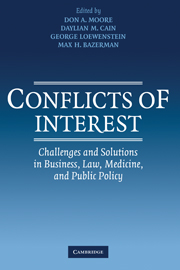Book contents
- Frontmatter
- Contents
- List of Contributors
- Acknowledgments
- Introduction
- PART ONE BUSINESS
- PART TWO MEDICINE
- 9 Physicians' Financial Ties with the Pharmaceutical Industry: A Critical Element of a Formidable Marketing Network
- 10 Commentary: How Did We Get into this Mess?
- 11 Why Are (Some) Conflicts of Interest in Medicine So Uniquely Vexing?
- 12 Commentary: Financial Conflicts of Interest and the Identity of Academic Medicine
- PART THREE LAW
- PART FOUR PUBLIC POLICY
- Index
- References
11 - Why Are (Some) Conflicts of Interest in Medicine So Uniquely Vexing?
Published online by Cambridge University Press: 04 August 2010
- Frontmatter
- Contents
- List of Contributors
- Acknowledgments
- Introduction
- PART ONE BUSINESS
- PART TWO MEDICINE
- 9 Physicians' Financial Ties with the Pharmaceutical Industry: A Critical Element of a Formidable Marketing Network
- 10 Commentary: How Did We Get into this Mess?
- 11 Why Are (Some) Conflicts of Interest in Medicine So Uniquely Vexing?
- 12 Commentary: Financial Conflicts of Interest and the Identity of Academic Medicine
- PART THREE LAW
- PART FOUR PUBLIC POLICY
- Index
- References
Summary
Over the past decade, four kinds of biomedical conflict of interest – two besetting academic researchers, and the other two physicians – have proved unamenable to any substantial consensus as to their seriousness. For researchers, they are the conflicts inherent in (a) grants from pharmaceutical or biotech companies and (b) peer review. For doctors, they are the conflicts created by (a) gifts of professional travel or equipment from pharmaceutical or medical-device manufacturers and (b) self-referral.
Organizations and institutions have adopted a gamut of different policies on these conflicts. Each of the four continues to provoke “deep divisions” (Moore, 1996, p. 173) or “endless debate” (Grace, 1998, p. A12), with some commentators demanding that they be “proscribed” (Kassirer & Angell, 1993, p. 570) and others insisting that they pose “no problem” (McDowell, 1989, p. 75). In what follows, I step back from these debates and, aided by comparisons with other professions, ask why they are so contentious. As I shall argue, these four conflicts all share a characteristic not found in the same pronounced way in any other professional conflict of interest, whether in medicine or elsewhere. My goal here is not to take sides on the question of whether these conflicts are to be prohibited or permitted. It is to analyze the debates surrounding them and to explain, by examining underlying issues of comparative professional structure, why those debates seem so relatively polarized.
- Type
- Chapter
- Information
- Conflicts of InterestChallenges and Solutions in Business, Law, Medicine, and Public Policy, pp. 152 - 180Publisher: Cambridge University PressPrint publication year: 2005
References
- 4
- Cited by



